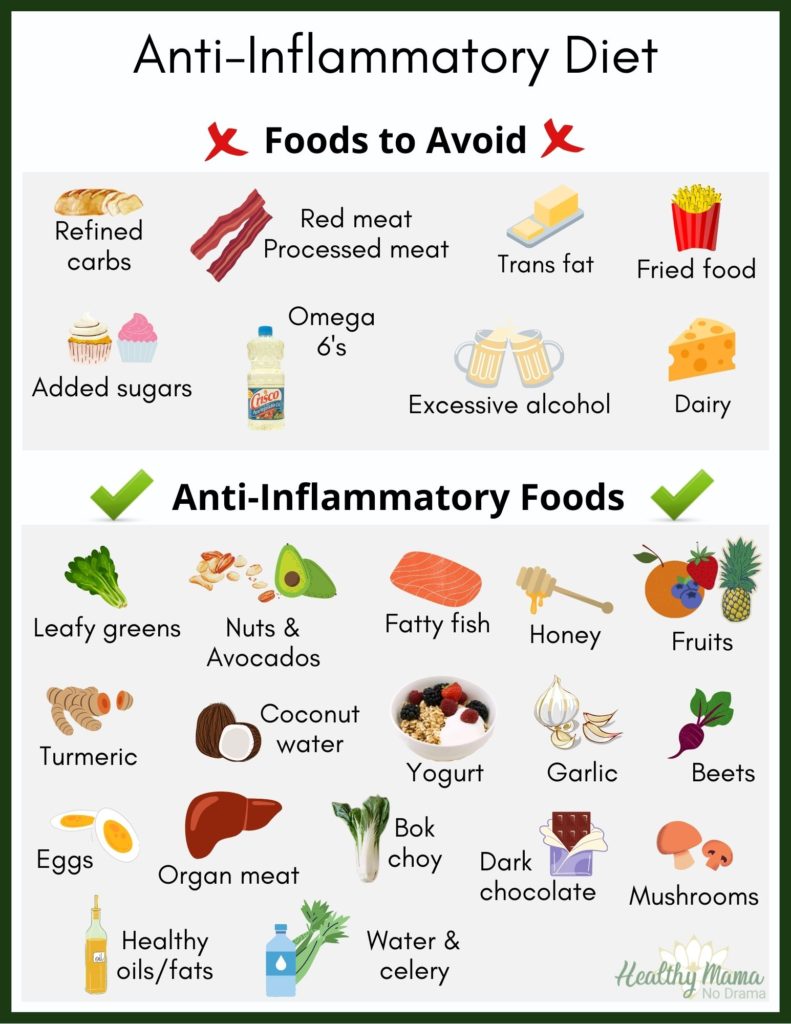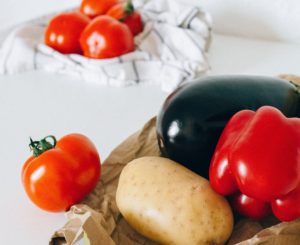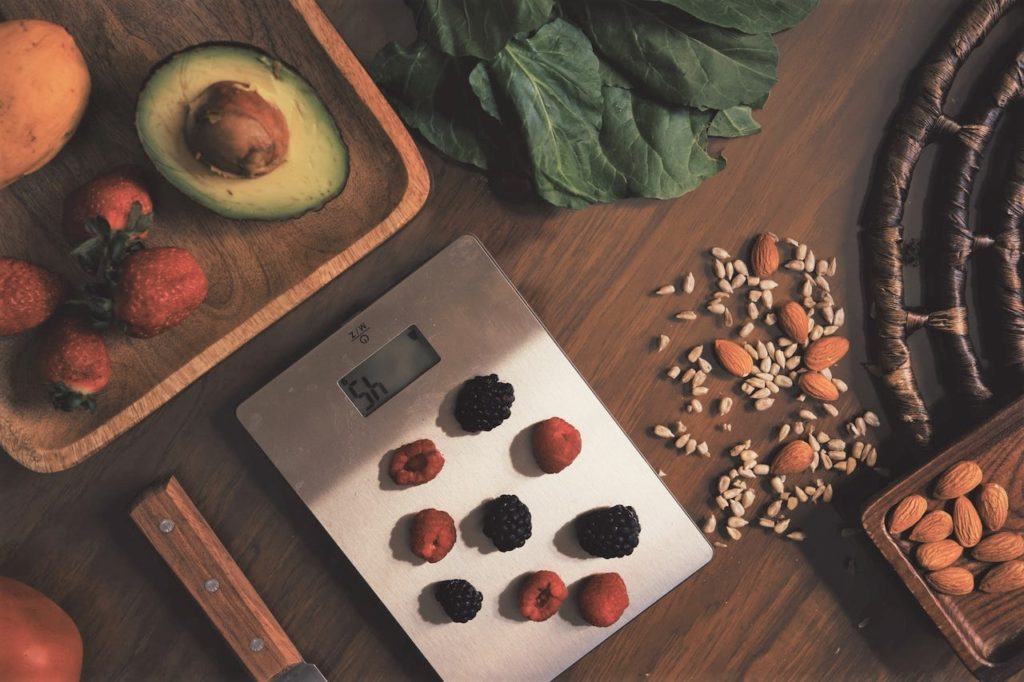There are certain times of the year where I feel we are more inclined to be aware of our eating habits: post-holidays to conform to new year’s resolutions, pre-summer to make sure we fit into our swimsuit, etc. You know what I mean. We’ve all been there, some more than others. Maybe you’re one of those people trying to reign your eating habits back in right now. Whether your goal is to lose weight, maintain your current weight, or just improve your diet for other health goals, the food you put in your body can have a huge impact on your overall health. Being intentional about what you put in your body is a very important decision that can have profound effects on your health.
What causes inflammation?
When your body recognizes foreign substances, your immune system kicks in. The result of this process is often inflammation. Now, inflammation in and of itself isn’t necessarily anything to be concerned about. Occasional inflammation is fairly normal and can actually be a way for your body to protect itself. However, chronic inflammation is not “normal” and should be taken seriously as it can be linked to a variety of illnesses. Some examples would be arthritis, diabetes, heart disease, stroke, cancer, axiety, depression, and Alzheimer’s.
In fact, it’s believed that the majority of our health issues today are connected in one way or another to inflammation in our bodies. Have you noticed how it seems like more and more people today are dealing with issues related to gut health? A lot of these are linked to inflammation in the gut. And, since gut health is directly linked to brain health, we’ve also seen an increase in various mental health issues. Diet can play a huge role in preventing health issues, but also in fostering healing for those dealing with them.
How do I prevent inflammation?
As you may have guessed, one of the best ways to fight inflammation in your body does not come from a drug store. Instead, it comes from the grocery store. By simply choosing to incorporate a larger number of anti-inflammatory foods into your diet, you can actually help reduce your risk of illness. However, if you fill your diet with inflammatory foods, you could increase your risk for illness and speed up the inflammatory disease process.
Below you’ll find an overview of the foods to avoid along with the foods to eat in order to fight inflammation in your body. I’ll also break each item down and explain how it’s harmful or helpful to your body in regards to inflammation, and I’ll share tips on what to look for with the foods that are anti-inflammatory.
Additionally, stay tuned for a way to get a weekly planner and recipe guide that will give you lots of great ideas to get started on an anti-inflammatory diet.

Foods that cause inflammation
Refined carbohydrates
Breads, rolls, crackers, french fries, sugary cereals, white rice, pasta. Refined carbs are lacking in nutrition and fiber. Replace them with 100% whole-grain alternatives like quinoa, oatmeal, and brown rice.
Red meat & processed meats
This includes foods like bacon, hot dogs, sausage, meat jerkies, pepperoni, salami, and some deli meats. Choose meats that have less that 4 grams of saturated fat per serving (most processed meats have at least 5). Rethink your plate. Make meat the side dish instead of the entree, or consider meat alternatives for your protein sources.
Trans fats
Margarine, shortening, and lard. Many options of microwave popcorn are also high in trans fat. Aim for less than 1 gram per day. Here’s the kicker – food labels are allowed to say “no trans-fat” or “trans-fat free” but still hide up to a half gram per serving. To find these hidden trans fats, look for “hydrogenated oils” or “partially hydrogenated oils.”
Fried foods
They are often fried in oils that are high in trans fats. Fried food is also stripped of its nutrients. I know fried food is just a special kind of goodness, but stay away when you can if you’re trying to fight inflammation. Or take those fried foods you love and make them at home, baking them in the oven! Unhealthy foods contribute to weight gain, which is a risk factor for inflammation.
Added sugars
Two of the big culprits are sucrose and high fructose corn syrup. Here’s a fun fact for you – the average American consumes 17 teaspoons of added sugar per day. Can you guess what we should be averaging? Six teaspoons or less! Yikes! Foods that often have added sugars include cookies, candies, sweetened beverages, cereal, breads, crackers, granola bars, and salad dressings. Avoiding all of these excess sugars will also help you avoid obesity, insulin resistance, diabetes, fatty liver disease, cancer, and chronic kidney disease. Now…those that know me know I love to bake. So I reach for healthier sugar options that are not as likely to cause inflammation such as raw honey, pure maple syrup, coconut sugar, monk fruit sweetener, or stevia.
Omega 6 fats
While they contribute to the good kind of inflammation that helps your body heal, they need to be balanced with omega-3s. And this balance requires intentional effort. Foods high in omega-6s are: canola oil, corn oil, mayonnaise, safflower oil, sunflower oil, peanut oil. Basically, vegetable and seed oils.
Excessive alcohol
Drinking heavily can result in bacterial toxins being leeched into the body from the colon, an issue often called “leaky gut.” Leaky gut can cause a significant amount of inflammation within your body, resulting in organ damage. This doesn’t mean you have to completely cut alcohol out of your life. All you really have to do is limit your intake to 2 standard drinks per day if you’re a man, or 1 if you’re a woman.
Dairy products
The human body is not designed to digest dairy. Some people handle it better than others. But, when our body recognizes a foreign substance, inflammation is often the result. Another reason dairy could cause inflammation is due to the high volume of saturated fats in full-fat dairy products like cheese and full-fat milk. If you’re struggling with inflammation of any kind, it might benefit you to cut back or cut out dairy.
Nightshade Vegetables
I’m putting this one in its own category due to the debate around whether nightshade vegetables are inflammatory or not. Nightshades are the edible part of certain flowering plants and include vegetables like tomatoes, potatoes, bell peppers, and eggplant (which many of these are technically considered fruits, but nonetheless). A good number of herbs and spices also come from nightshade plants, including cayenne pepper, chili powder, paprika, and more.

The reason many believe nightshades are inflammatory is because they have a high alkaloid content. But, the concentration is pretty low in the part of the plant that we eat. Many believe that some of the compounds found in nightshades are toxic (but this typically requires eating very large amounts) and may worsen symptoms from existing inflammatory conditions. This would include symptoms like joint pain, swelling, and digestive issues. But the scientific evidence to support this theory is rather lacking. On the other hand, there is research that suggests nightshades can actually have anti-inflammatory effects.
My conclusion?
Nightshades are not bad for you. In fact, they are packed with nutrients and can have some very powerful health benefits. That being said, those with existing inflammatory conditions along with anyone who may feel they are developing a food sensitivity or are experiencing chronic inflammation should speak with their doctor. Otherwise, eat nightshades. There would be no reason to completely cut them out of your diet. Like all other things, moderation is key. We should all aim to eat a wide variety of fresh produce to get the various nutrients each can offer.
Anti-Inflammatory Foods
Green leafy vegetables
Leafy greens like spinach, kale, collards, broccoli, brussel sprouts, cauliflower (even though it’s not green), and cabbage are rich in vitamins K and E, along with other nutrients that are shown to fight inflammation. With these vegetables, it’s important to try and get organic as they are some of the most vulnerable to pesticides.
Nuts, seeds, and avocados
They have plenty of monounsaturated fatty acids, specifically oleic acid, which has some anti-inflammatory properties. Although higher in omega-6s, which can be inflammatory, the other nutrients help make them good anti-inflammatory options. Most nuts and seeds also have Vitamins E and B6, which can offer anti-inflammatory properties.
Fatty fish
Eating fish that are high in omega-3 fatty acids is a great way to balance the omega-6s in your body (can cause inflammation when out of balance) along with supporting cellular health. Look for salmon (farmed salmon will have higher omega-3s than wild), Atlantic mackerel (much higher omega-3s than king mackerel), albacore tuna, sardines, trout, Alaska pollock, Atlantic herring, mussels, and anchovies.
Fruits
Your best choices are: berries, cherries, oranges, pineapple, and grapes. They are high in antioxidants and other nutrients. They also help target free radicals in the body that can cause inflammation among other issues. As with the leafy greens, soft-skinned fruits are very vulnerable to pesticides. Choose organic options if possible.
Turmeric
Fights inflammation along with increased metabolism, increased fat burning, enhanced brain plasticity, and learning, and increased insulin resistance. If you’re not someone that includes turmeric in your regular diet, or even if you are, I highly recommend this turmeric supplement. It has both a powder and liquid form within the capsule, which research has shown makes it 11 times more powerful in terms of bioavailability and potency.
Coconut water
Aids with the balance of your body’s electrolytes. This helps improve all functions of the nervous system, resulting in the body being able to improve, repair, and reduce inflammation. Also a great option for hydration and electrolytes when exercising or for anyone who is ill! My recommendation for a quality and clean coconut water is this one. They use flash pasteurization to preserve the naturally-occurring nutrients in the coconuts and it has zero added sugar or preservatives. If you find it hard to get plain coconut water down, this one is a great option due to its organic certification and smooth but not overly sweet taste. It does have a small amount of added sugar.
Locally sourced, raw honey
Local honey can act as a mild antihistamine to help calm allergic reactions to environmental elements. These allergic reactions can cause inflammation. Make sure it’s raw honey to receive all the nutritional benefits. Try your local farmer’s market. Sometimes you can get lucky and find local honey at the grocery store.
Yogurt
Contains healthy bacteria (probiotics) that can help reduce inflammation. Probiotics can also help fight against illness while also killing unwanted bacteria, which can cause inflammation. Check out my homemade instant pot yogurt recipes for several different recipes, including dairy-free and vegan.
Garlic
Shown to increase the flow of blood and oxygen through the body. This helps flush away fluids that build up due to inflammation, and also helps prevent future build-up. Garlic has the highest anti-inflammatory properties when raw. If you can’t handle taking it on a spoon by itself, try adding it to a spoonful of honey or consider eating it in salsa, pesto, or adding some to a salad or your salad dressing.
Beets
Another food that helps increase blood flow and, therefore, prevents fluids from getting built up in your body and causing inflammation. Beets are high in antioxidants which help fight against inflammation from free radicals
Eggs
Contain all the essential amino acids that help fight inflammation, along with vitamin B8. For optimal health benefits, look for pasture raised (free range is good but not as ideal), organic, Grade AA or Grade A.
Organ meat
You know, liver…kidney…brain. All those meats that we eat all the time anyway. Ha! But seriously, even if they’re not your favorite, if you can tolerate it, you’ll be getting lots of nutrients that help fight inflammation. Maybe just slather some BBQ sauce over it.
Bok choy
A great source of omega-3s and vitamin C, both of which help to reduce inflammation. Your best bet will be to get organic to avoid the added pesticides that will only cause more problems in your body.
Dark chocolate
Lower in sugar, and contains phytonutrients that help reduce inflammation. Now, go get yourself some. You’re welcome.
Mushrooms
Happens to be one of the only food sources for vitamin D, which helps strengthen the immune system. A strong immune system can help fight against issues that may be causing inflammation. Another important one to buy organic due to their soft, porous skin that acts like a sponge and will soak up pesticides.
Choose the right oils / fats
Raw butter, grass-fed ghee, whole pressed coconut oil, avocado oil, cold-pressed extra virgin olive oil, and walnut oil are all anti-inflammatory. For more information on healthy oil options for cooking and baking, check out Healthiest Cooking Oils and Healthy Baking Substitutes.
Water
As we all know, water prevents dehydration. But did you know that dehydration can cause inflammation. Additionally, celery, because it’s made up primarily of water along with several other key nutrients that help fight inflammation.
Your best bet to reduce inflammation is to aim for an overall healthy diet. And, I have the perfect resource for you! It’s a weekly planner and shopping guide that comes with lots of super yummy recipes! You can request your free copy here.
Another great option is following the Mediterranean diet. It has a focus on fruits, vegetables, nuts, whole grains, fish, and healthy oils. For tips on incorporating the Mediterranean diet in your day-to-day life, check out this article by Harvard Health Publishing. Additionally, here is an example 7-day meal plan and snack ideas following the principles under the Mediterranean diet.
Additional benefits to adopting a more natural, less-processed diet include positive effects on your physical and emotional health. A healthy diet will support your overall quality of life by reducing the risk of chronic illnesses. It will also proactively help you support your gut health, which we know has a direct link to mental health.
Related posts:
- Healthiest Cooking Oils There are many oils on the market today. Some well-known, some not. Many people just grab the cheap and accessible vegetable or canola oil off the shelf without realizing the...
- Gut Health: The Shocking Truth A healthy gut is foundational to a healthy you. The human gut does more than just digest food and absorb nutrients. There's a reason it's called the second brain. Your...
- Why Essential Oils Are…Essential If you’ve done even a small amount of researching online about natural health, chances are that you’ve come across essential oils. Their popularity is ever-growing both in the natural world...
- Preventative Health & Wellness It's great to have so many options at our fingertips today to address various health and wellness concerns. But, I think we can agree that being preventative with our health...


